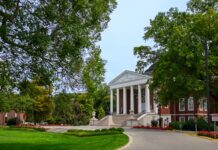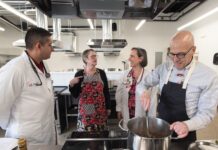Nucleus, an initiative of the University of Louisville Foundation, is overseeing the park’s development.
Nucleus epitomizes what we’re trying to do in Kentucky in terms of attracting and incubating biotech and life science discoveries and companies, said Kentucky Gov. Steve Beshear. Today is an important milestone.
Beshear and Louisville Mayor Jerry Abramson took part in the announcement at an afternoon press conference on the property.
Nucleus has named architects Arrasmith, Judd, Rapp, Chovan Inc. and construction firm Sullivan & Cozart Inc. to the project. The first building is to be 160,000-square-feet in size and cost $20 million. It is expected to be finished in 2012.
Construction of the first building on the old Haymarket site shows UofL’s Nucleus is serious about, and making progress toward, a full-blown downtown research park, said UofL President James Ramsey. This park and the ideas, research and technologies grown here are the economic future of Louisville and Kentucky.
Nucleus already has verbal commitments from enough tenants for 60 percent occupancy in the first building. That building’s anchor tenant will be Signature HealthCARE’s International Center for Long Term Care Innovation and Center for Aging. The research park also will be home to laboratories and office space for UofL students, faculty and staff, as well as to private life science and wellness companies.
In 10 years, when we have 100 start-up companies here, we’ll look back to and say it’s because of what’s happening today, said Joe Steier, Signature HealthCARE’s chief executive officer.
When the research park is fully completed, it is expected to generate 8,700 skilled jobs. The physical facility will consist of two eight-story buildings on Market Street and two taller towers on Jefferson Street with a walled courtyard between.
Funding for the development will come, in part, from tax-increment financing, a state program that allows gradual increases in certain tax revenue from a specific area to be directed to public infrastructure projects. In this case the district includes the 210-acre development area around the Haymarket site.
Nucleus was founded in 2008 with the goal of fully integrating all assets of UofL, including life sciences, with those of the region to leverage their strengths for university academic enrichment and for community economic development.



























